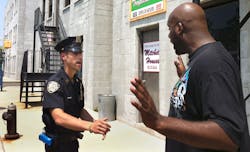The number of stop and frisks by the NYPD continued to plummet in the fourth quarter of 2013, dropping by over 40 percent from the previous quarter, according to police data obtained Monday by Newsday.
Combined with statistics for previous months, stop-and-frisk actions last year dropped to 191,588, a decline of 67 percent from 2012. Stops reached almost 700,000 in 2011, the most active year for the practice, and then proceeded to drop sharply as a federal lawsuit challenging the NYPD on the tactic gathered steam.
The latest quarterly statistics also showed that while the percentage of stops involving blacks and Hispanics dipped slightly, the current figure of 81.6 percent was close to the historical averages of between 83 percent to 86 percent. Whites comprised 11.3 percent of the fourth-quarter stops and Asians 4.7 percent, also slightly less than the third quarter, the data showed.
The statistics were provided by the NYPD to the City Council as required by law and obtained by Newsday.
An NYPD spokesman confirmed the 191,588 number of stops for last year but wasn't available late Monday for further comment.
Mayor Bill de Blasio announced earlier that the city intends to settle the federal lawsuit in which Judge Shira Scheindlin found that the NYPD carried out stop and frisks in an unconstitutional way as an "indirect" form of racial profiling. But her ruling was put on hold by an appeals court and she was removed from the case. Police unions are seeking to intervene in the case and prevent a settlement.
By settling the case, the city hopes to put the stop-and-frisk issue behind it as Police Commissioner William Bratton tries to reform training to prevent future problems and answer critics of the department.
Bratton's predecessor, Ray Kelly, strongly defended the use of stop and frisks as a lawful police tactic. He and other officials attributed the steady decline in stops to better training and a reduction of the officers placed in special NYPD impact zones, areas of high crime that get concentrated police activity. Kelly and former Mayor Michael Bloomberg credited stop-and-frisk tactics with contributing to big declines in crime and homicides in the past 12 years.
Copyright 2014 Newsday
McClatchy-Tribune News Service



